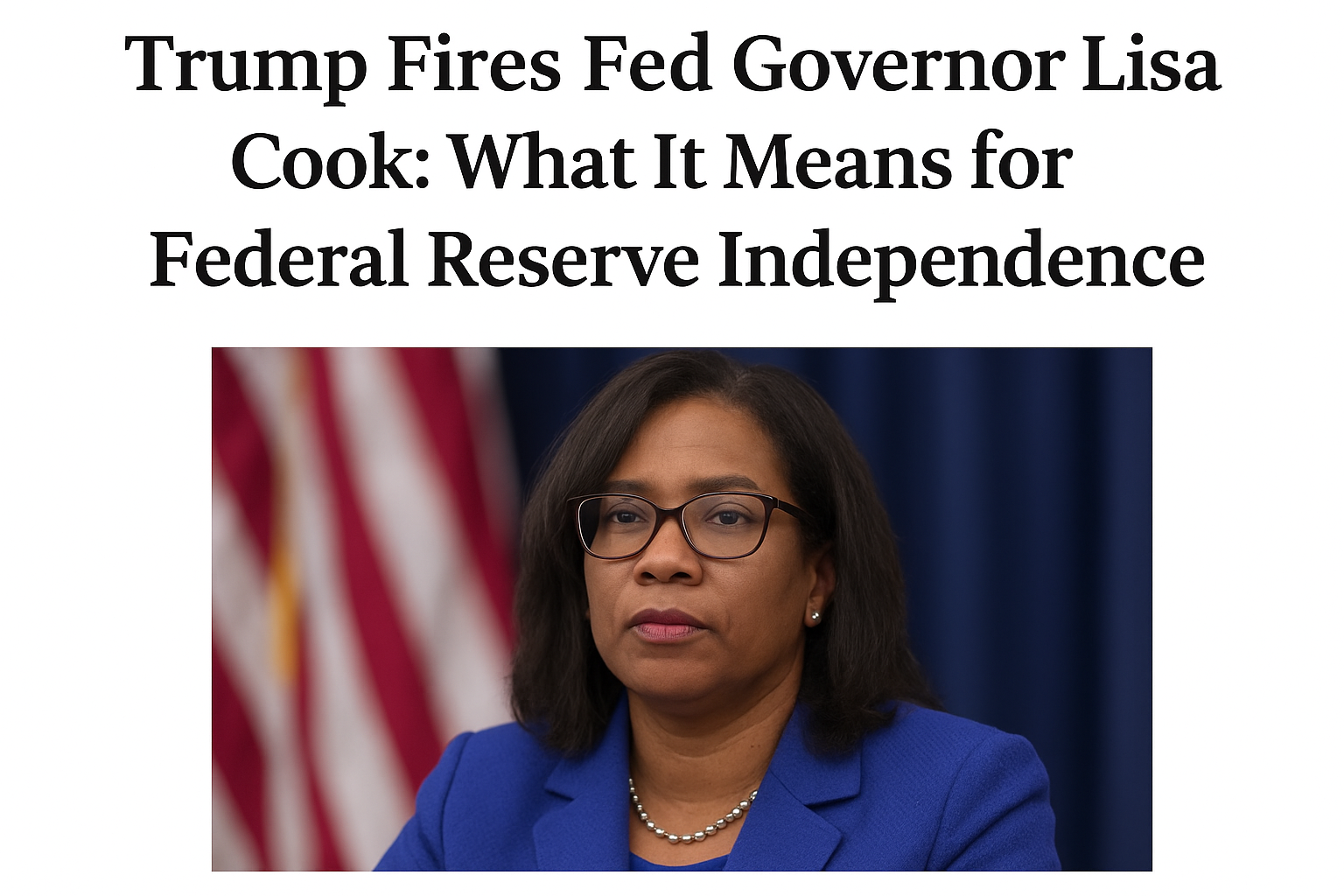Trump Fires Fed Governor Lisa Cook: What It Means for Federal Reserve Independence
Trump’s Firing of Fed Governor Lisa Cook: What It Means for Central Bank Independence
By rkrohitkumar688@gmail.com | August 26, 2025
Trump fires Fed Governor Lisa Cook ,The financial and political worlds were shaken this week as President Donald Trump announced the firing of Federal Reserve Governor Lisa Cook, accusing her of mortgage fraud and citing it as “cause” for dismissal. While the allegations themselves are disputed, the bigger story is not just about one governor. It is about the independence of the Federal Reserve—the institution tasked with guiding America’s economy free from partisan influence.

This unprecedented move by Trump could redefine how much political power a president has over the central bank and whether future leaders can bend monetary policy to their will. The stakes could not be higher: the credibility of the U.S. dollar, investor confidence, and America’s long-standing tradition of central bank independence all hang in the balance.
Why Trump Fired Lisa Cook
Trump’s firing Fed Governor Lisa Cook, letter claimed that Cook misrepresented two different properties as her primary residence on mortgage applications in 2021. He argued that this constituted fraud, violating the “good cause” clause in the Federal Reserve Act of 1913, giving him grounds for removal.
Lisa Cook, however, flatly denied the claims and said she would not resign. She pointed out that these mortgage details were already disclosed during her Senate confirmation process in 2022, and thus cannot be considered new grounds for dismissal. Cook also argued that the president does not have unilateral authority to remove a sitting Fed governor without congressional or judicial approval.
The clash sets the stage for a constitutional showdown. Lawyers expect the case could ultimately be decided by the U.S. Supreme Court, making it one of the most consequential legal battles over economic governance in decades.
A Historic First for the Federal Reserve
Trump fires Fed Governor Lisa Cook,Never in the Fed’s 111-year history has a sitting governor been fired by a U.S. president. While presidents have often clashed with the Federal Reserve—think Richard Nixon pressuring Arthur Burns in the 1970s or Trump himself attacking Jerome Powell during his first term—these disputes were always rhetorical.
By moving beyond words to direct removal, Trump has crossed a line that past presidents avoided. Critics argue this could set a dangerous precedent: if presidents can dismiss Fed governors whenever they dislike monetary policy decisions, the central bank becomes just another political arm of the White House.
Market Reactions: Caution, Not Panic
Financial markets did not collapse, but they certainly responded. The U.S. dollar dipped, Treasury yields fell, and gold prices spiked—a classic sign that investors expect looser monetary policy and are seeking safe-haven assets.
Traders are now betting that a Trump-influenced Fed could pursue rapid interest rate cuts ahead of the 2026 election, which would stimulate short-term growth but potentially reignite inflation.
Wall Street analysts warned that continued interference with the Fed could undermine the dollar’s reputation as the world’s reserve currency. A weaker perception of independence could cause global investors to diversify away from U.S. assets, leading to long-term financial instability.
The Bigger Question: Can the Fed Stay Independent?
Central bank independence is not just an academic idea—it is one of the bedrocks of modern economic stability. The logic is simple: elected politicians often prefer short-term growth to help their re-election chances, even if it fuels long-term inflation. The Fed, by contrast, is designed to act as a technocratic body, making decisions based on data, not politics.
If Trump succeeds in firing Cook and potentially stacking the Fed’s Board of Governors with loyalists, the balance of power could shift. Already, Trump has nominated economist Stephen Miran, a supporter of looser monetary policy, to another vacancy. Combined with Cook’s possible removal, this would tilt the Fed toward Trump’s preferred economic agenda.
Global Alarm Bells
The controversy isn’t just an American issue. At the Jackson Hole symposium last week, European central bankers quietly voiced concerns that Trump’s battle with the Fed could weaken confidence in independent central banking worldwide.
From the European Central Bank to the Bank of Japan, global policymakers are worried that if the U.S. political system allows direct control of the Fed, other governments may follow suit. This would erode decades of progress in keeping politics out of monetary decisions, potentially leading to a new era of inflationary risk.
What Happens Next?
Lisa Cook has made it clear she will not step down voluntarily. Her legal team is preparing to challenge Trump’s authority, and Congress may also intervene. With Democrats strongly defending Cook and some Republicans privately worried about the long-term damage to the Fed’s credibility, the fight could drag out for months.
Meanwhile, Trump is framing the issue as one of accountability, insisting that “no one is above the law,” not even a Fed governor. But his critics say the real goal is control—reshaping the Fed into a political tool to deliver lower interest rates and fuel economic expansion ahead of 2026.
Why This Matters for Everyday Americans
At first glance, the firing of a central banker may seem like a niche issue for economists and Wall Street. But in reality, it affects everyone. The Fed’s decisions determine:

-
Mortgage rates that families pay on their homes.
-
Car loan and credit card interest for everyday spending.
-
Job growth and inflation, which directly impact household budgets.
-
Retirement savings, since markets respond to Fed policy.
If political pressure forces the Fed to slash rates too quickly, inflation could come roaring back, making groceries, gas, and rent more expensive for ordinary Americans.
Conclusion: A Defining Moment for U.S. Democracy and Economics
President Trump’s decision to fire Lisa Cook is more than a political skirmish—it is a turning point for the future of central banking in America. For over a century, the Fed has been shielded from direct political interference to ensure stable, long-term economic management.
Now, that independence is under threat. Whether Cook remains in her position or is replaced by a Trump ally, the precedent has been set. The outcome will shape not only the Fed’s credibility but also the stability of the U.S. economy and the trust of global investors in the dollar.
In short, this fight isn’t just about Lisa Cook—it’s about whether America still believes in keeping politics out of its money.







